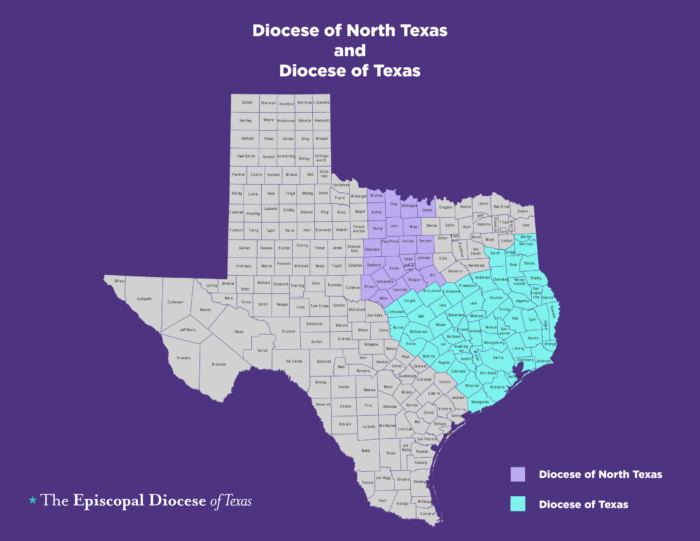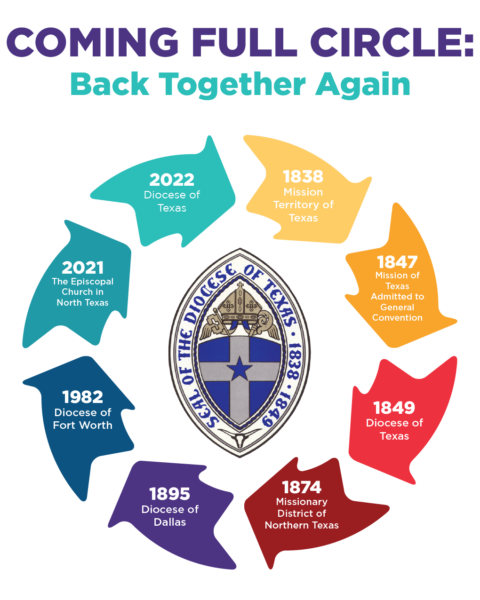Diocese of Texas approves merger with North Texas diocese; next vote set for June 18Posted Jun 10, 2022 |
|
[Episcopal News Service] Two Episcopal dioceses in Texas took a step closer to merging when the Diocese of Texas’ Diocesan Council on June 9 voted overwhelmingly in favor of the plan. A corresponding vote is scheduled for June 18 by leaders of the Episcopal Church in North Texas, a neighboring diocese based in Fort Worth.
Under the plan, announced in April, the Episcopal Church in North Texas would cease to be a distinct diocese and would become the North Region of the Diocese of Texas, which is based in Houston. In an online session, Texas’ Diocesan Council voted 526-14 in favor of a merger. It also authorized adding an assistant bishop to oversee a newly created North Region of the diocese.
“The people in Fort Worth are eager to meet and have conversation,” Bishop Andrew Doyle said after the votes. “This is an exciting moment for the Diocese of Texas.”
Northwest Texas Bishop Scott Mayer, who also serves as bishop provisional of North Texas, issued a statement in response to the votes. “The overwhelming support of the voters at the Diocese of Texas Council for the reunification of our two dioceses is evidence, not only of the careful, thorough work of the leaders of both dioceses, but also, I think, evidence of the presence of the Holy Spirit in this process,” Mayer said.
“Many people, both lay and ordained, are working hard to make this as loving and transparent a reunion as possible, because we believe it strengthens both parties. We ask the prayers of the church as this process moves forward.”
The proposed merger is following a canonical process known as reunion because the North Texas diocese once was part of the Diocese of Texas. Reunions normally require only the consent of a majority of bishops and diocesan standing committees of The Episcopal Church, but because this reunion is happening so close to the 80th General Convention, the House of Bishops and House of Deputies will be asked when they meet in July to approve the reunion in lieu of bishops’ and standing committees’ consent.
 “I hold the Diocese of North Texas close to my heart for their courage and steadfast faithfulness in defending The Episcopal Church, and I am deeply grateful for the wisdom and generosity of the Diocese of Texas in agreeing to consider this promising new path,” the Rev. Gay Clark Jennings, president of the House of Deputies, said in a statement released in support of the reunion. “May their efforts, and those of dioceses in the midst of similar adaptations, model for the whole church the blessings of deeper collaboration.”
“I hold the Diocese of North Texas close to my heart for their courage and steadfast faithfulness in defending The Episcopal Church, and I am deeply grateful for the wisdom and generosity of the Diocese of Texas in agreeing to consider this promising new path,” the Rev. Gay Clark Jennings, president of the House of Deputies, said in a statement released in support of the reunion. “May their efforts, and those of dioceses in the midst of similar adaptations, model for the whole church the blessings of deeper collaboration.”
The North Texas diocese, with 14 congregations and fewer than 4,000 members, had been greatly diminished in membership since a 2008 schism, in which a majority of clergy and lay leaders in the Episcopal Diocese of Fort Worth voted to leave The Episcopal Church over disagreements about the ordination of women and LGBTQ+ people.
The last time a diocesan reunion occurred in The Episcopal Church was 2013, when the Diocese of Quincy reunited with the Diocese of Chicago in Illinois. The three dioceses in Wisconsin are in the middle of their own reunion talks, with plans to become one diocese again.
 All six Episcopal dioceses in the state of Texas have roots in the Diocese of Texas, which started in 1838 as a foreign missionary district. Texas, formerly part of Mexico and then an independent country, became a U.S. state in 1845, and the church’s missionary district organized as a diocese in 1849. The northern and western regions of the Diocese of Texas separated to become new missionary districts in 1874 in response to rapid population growth. In 1895, the northern district formed the Diocese of Dallas, which included congregations in Fort Worth and other cities to Dallas’ west.
All six Episcopal dioceses in the state of Texas have roots in the Diocese of Texas, which started in 1838 as a foreign missionary district. Texas, formerly part of Mexico and then an independent country, became a U.S. state in 1845, and the church’s missionary district organized as a diocese in 1849. The northern and western regions of the Diocese of Texas separated to become new missionary districts in 1874 in response to rapid population growth. In 1895, the northern district formed the Diocese of Dallas, which included congregations in Fort Worth and other cities to Dallas’ west.
The growing Diocese of Dallas was split in half in 1982, with the western congregations forming the new Diocese of Fort Worth. Once numbering more than 50 congregations, Fort Worth was long known as one of the most conservative dioceses in The Episcopal Church, particularly for its exclusion of women from ordination.
After the 2008 schism in Fort Worth, the breakaway group aligned with the Anglican Church in North America, or ACNA. Most congregations that remained in The Episcopal Church found new places to worship after the split, but six congregations in Fort Worth, Hillsboro and Wichita Falls remained in their buildings. The Episcopal diocese sued in 2009 to retain and regain more than $100 million in diocesan property.
In May 2020, the Texas Supreme Court sided with ACNA, and in February 2021, the U.S. Supreme Court announced it wouldn’t review the case, letting ACNA’s victory stand. The Episcopal diocese agreed to change its name to the Episcopal Church in North Texas, and in April 2021, the rest of its congregations were ordered out or chose to move out of the buildings that had been awarded to ACNA.
Since then, Episcopal congregations and ACNA congregations have continued to argue in a lower court over what other property needs to be turned over to ACNA.
The Diocese of Texas is one of the largest in The Episcopal Church, with 167 congregations and 72,000 members. It already has two bishops suffragan and a bishop assistant, each assigned to a different region of the diocese. North Texas would become the diocese’s fourth region.
– David Paulsen is an editor and reporter for Episcopal News Service. He can be reached at dpaulsen@episcopalchurch.org.

Social Menu